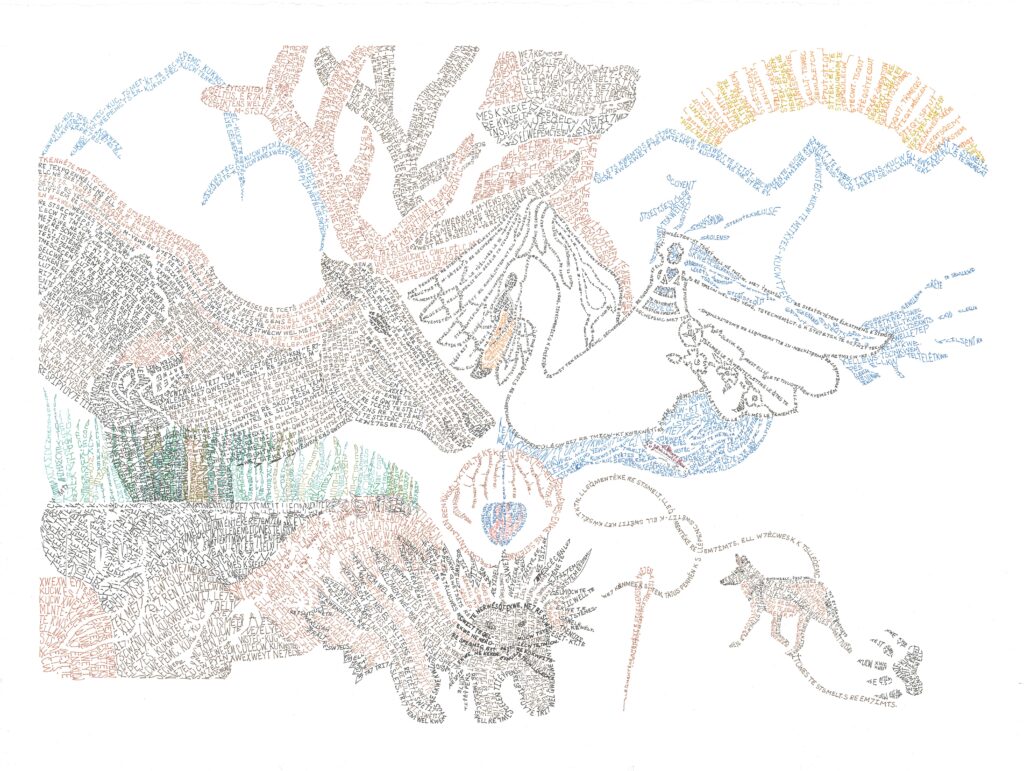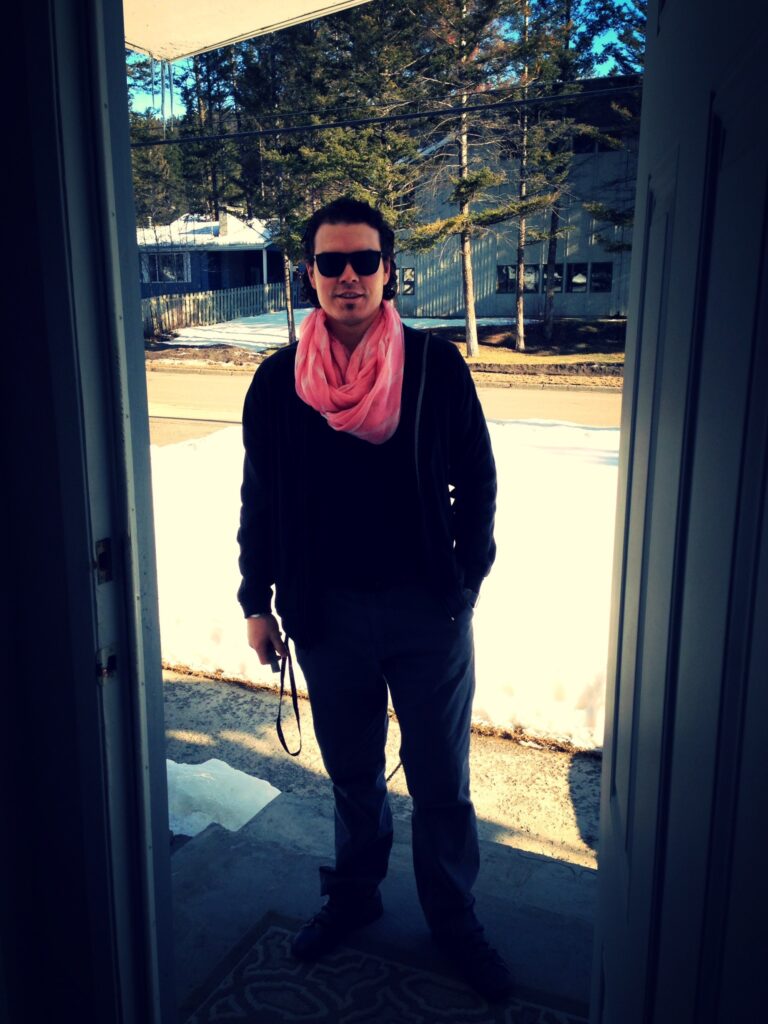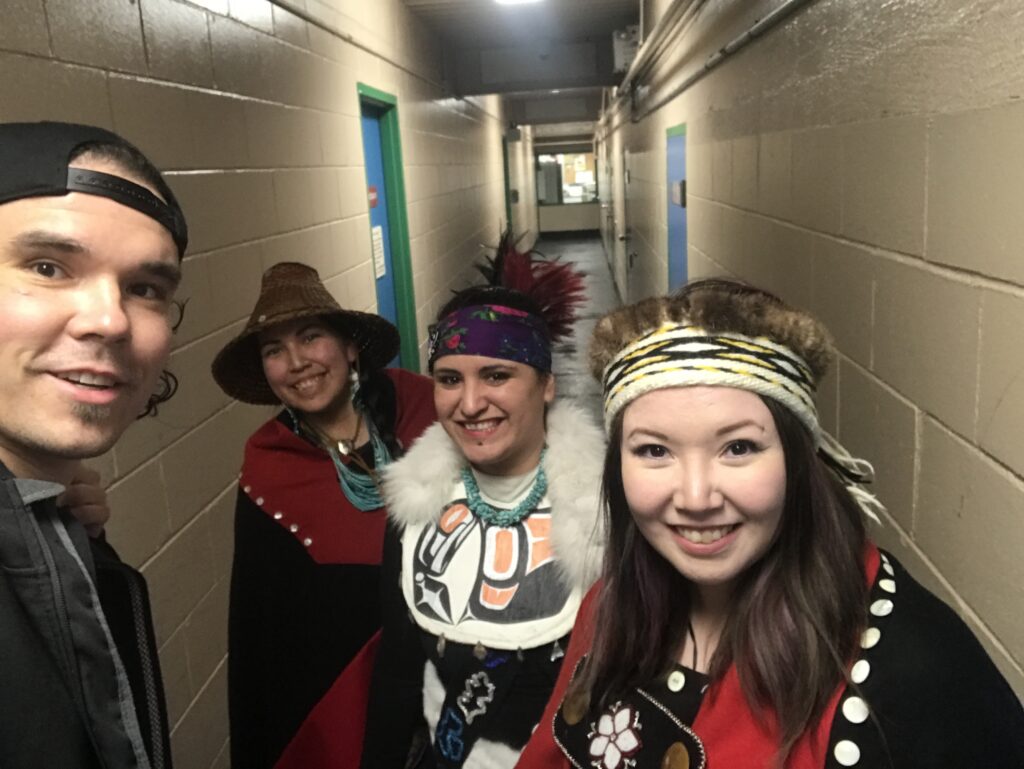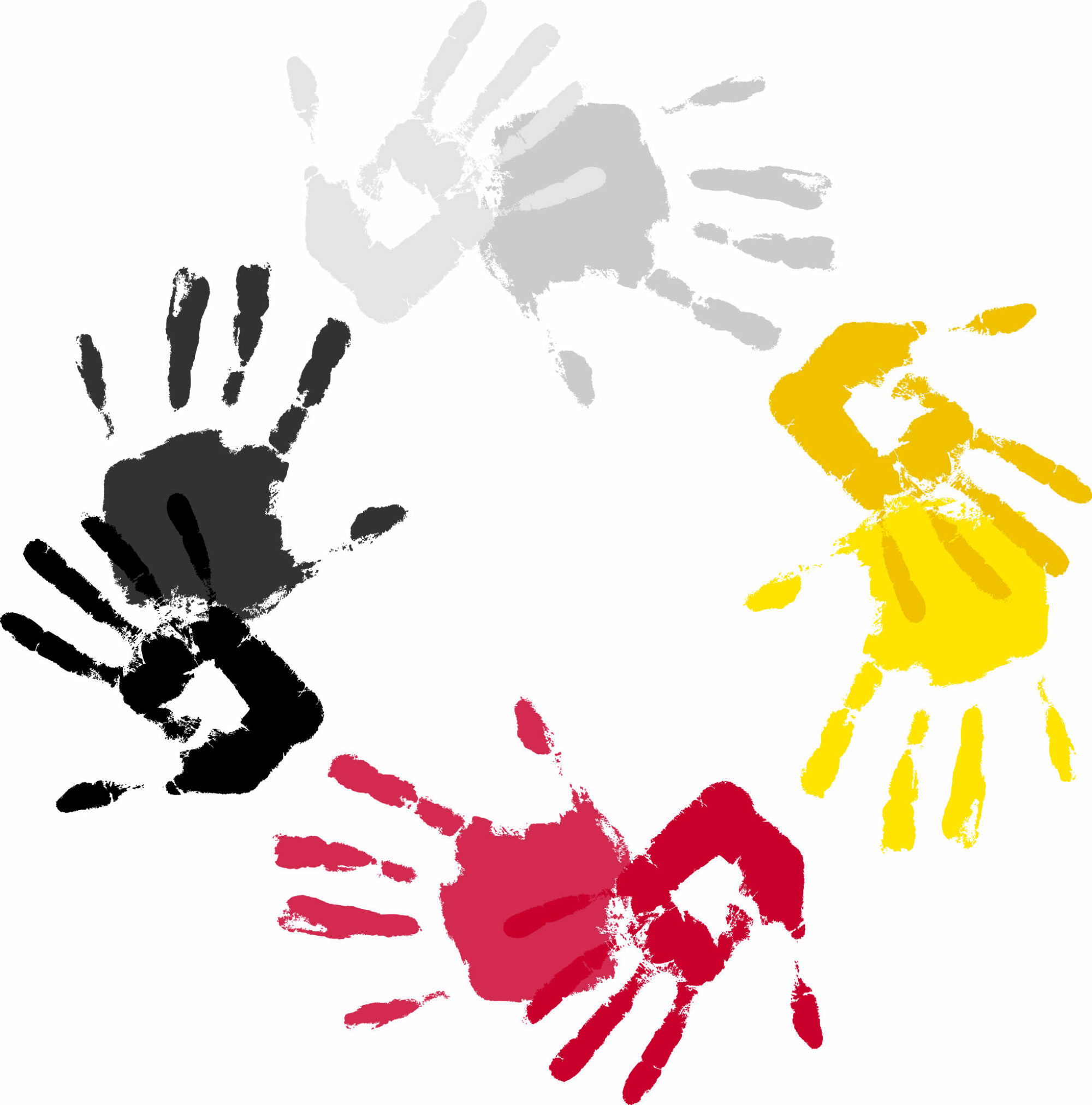
Qwelmínte Secwépemc Knowledge Builders Program
The Knowledge Builders Program provides the opportunity for Indigenous and non-Indigenous individuals from different Nations the chance to become balanced with Walking on Two Legs (Western and Indigenous ways of knowing and being). The Knowledge Builders cohort’s diversity continues to bring unique and valuable perspectives to the Qwelmínte Secwépemc collective as well as helping them grow in their respective field of study or workplace.
The program consists of five layers – elementary, secondary, internship, coordinator, and senior management. Through the summer months, post-secondary interns work on the cutting edge of upholding Secwépemc Law and supporting the implementation of Indigenous Rights and Title.
Qwelmínte Secwépemc successfully completed four years of the post-secondary Summer Internship with students from different academic areas such as Anthropology, Education, Engineering, Environmental Policy & Science, Law, Fine Arts, and Political Science. I was a part of the intern program for two summers and then moved into a coordinatoring role with the Guardian and Intern Program. I now have the privilege and honour of being the Knowledge Builders Program coordinator and inclusive of both the Team Skú7pecen Intern and Guardian Program, ensuring successful development, implementation and monitoring in order to support the development of the next generation of practitioners.
Mentorship is a key goal of the Knowledge Builders Program and is provided through all layers. Directors and managers will have interns tagged to projects under their responsibility and guide them personally and professionally. In addition, Interns are paired with high school guardians to allow for inspiration and peer mentorship. The interconnection of positions allows for an increased knowledge transfer, smart succession planning, motivation of professional development and accountability, and stronger internal networks.
Interns are given the opportunity to be active learners and volunteers at signatory and nation events. Volunteering is an excellent place to experiment, practice and learn Secwépemc language and customs. It offers the opportunity build self-confidence through practice.
The post-secondary internship consists of the following key components over the summer months: On The Land Lessons – Secwépemc protocols, harvesting; Secwepemctsín weaved throughout the program – in our documents, stories, operations, and language lessons; and Mentorship from Qwelmínte Secwépemc staff, Signatory Leadership, and BC gov’t staff
Community Support
Le Estcwicwéy’ – one year memorial, Pulling Together Youth Canoe Journey, Secwépemc Summer Gathering, School District 73 Powwow, and Secwépemc Landmarks Project, Cumulative Effects (holistic land use planning), Speaker Series (Western and Indigenous Knowledge Carriers and Elders), Capstone Projects, etc.
The Knowledge Builders Program ensures that the next generation of leaders and technicians will be well-rounded practitioners; it is grounded on Secwépemc and In- digenous law and is designed to connect Interns and Guardians to tmicw, Secwepemcúl’ecw, Knowl- edge Keepers and Elders. Qwelmínte Secwépemc Knowledge Builders be- come active players in the work of reconciliation, enhance signatory re- silience and capacity, as well support transformative nation-building.
Qwelmínte Secwépemc Internship

As a Qwelmínte Secwépemc (QS) Summer Intern for the last two summers, I had the pleasure of experiencing and learning not only the practical side of being at a government-to-government table with the Province of British Columbia but had the added opportunity to apply my lived Indigenous experiences and post-secondary skills to a setting that equally valued both skillsets. During my internship, I further developed my understandings of Secwépemc culture and heritage, developed curriculum for both post-secondary and elementary levels, built skills relating to communications, including research, video development, interviewing, etc. In addition, my internship allowed me to build valuable rapport with Elders, Knowledge Carriers, and contractors who were a part of our QS Summer Speaker Series. The invaluable skills I’ve learnt during my internship also includes: administration, leadership, group/contractor coordination, operation of various communication platforms; building repositories, developing meaningful relationships with QS signatories and community members, facilitating QS signatory request, filming, etc.

Essential to the Team Skú7pecen model and Qwelminte Secwépemc’s principle of capacity building is the Summer Intern Program. The internship is open to Indigenous students at the university level and the interns selected become active players for transformation in land and resource management in a manner that upholds Secwépemc law, jurisdiction and governance. This unique and multi-faceted intern experience had supported my professional growth in a manner which ensures I will become a well rounded practitioners of the future who can Walk in Both Worlds. Below are some videos and news releases explaining the intern program, what I did within QS, our graduation and a preview of my first and second year with Qwelmínte Secwépemc as an intern.
Youth Cultural and Recreation Coordinator

I had the privilege to work with some amazing youth, teens, Knowledge Keepers, Elders, and other members of the Skeetchestn Indian Band and surrounding communities.

As the Youth Recreation Coordinator/worker I was tasked with developing, administering and delivering/implementing and evaluating programs for youth and adults within the community of Skeetchestn. The programs were targeted towards youth and adults from all age groups where the scope of activities include arts-based, health and well-being, cultural, outdoor education and sports/fitness activities. The purpose of the Youth Recreation
Coordinator role was to support and facilitate in strengthening youth and overall community well-being through cultural engagement/continuity and self- discovery.
Responsibilities of the Youth Recreation Coordinator also included: planning events/activities for the youth of all group age, adults, and families of the Skeetchestn Band; scheduling and promoting youth, adults and community activities and events on a monthly basis; getting the youth involved and active; seeking opportunities for youth involvement within and outside the community; being present to youth concerns and work closely with the social development team, including QHS and the community school to enhance programming; administrating the department’s budget; fundraising for youth events if needed; prospecting for new funding opportunities, write proposals and apply for grants and reporting to funding sources; participating in community consultation sessions and conduct surveys from time to time to gather input or evaluate satisfaction; preparing regular youth activity reports, presentations, program impact updates (evaluate effectiveness); and developing and maintaining strong relationships with the youth and their families, and all community members.
First Nation Support Worker – School District #27

As the First Nations Support Worker my responsibilities/tasks included: working one-on-one or in small groups with students from kindergarten to grade seven on work habits, skill development and self-esteem, provides support for students in the school or classroom setting; assisting students in identifying skills/strategies that enable productive/progressive academic results; assisting teachers in developing and adapting teachable activities with a focus on Indigenous culture; collaborating with school-based sports teams and acting to advocate for Indigenous students and their family’s when needed; developing, implementing and supporting enrichment activities specific to Indigenous cultures; coordinating and participating in before/after school programs,

including floor hockey, basketball, etc.; maintaining open communication with parents of Indigenous students, community representatives, and school personnel in order to meet the academic needs and well-being of the student, and acts as a mediator when Indigenous student needs and school needs are in conflict; remaining aware of different learning needs of children and works effectively with children individually or in small groups; judges, selects and implements an appropriate course of action according to student needs as directed by classroom teacher or school administrator; maintaining written reports and documentation relating to student academic, social and emotional progress and growth, intervention strategies, and summaries of work done with a student and be available to report monthly; operating standard office equipment including computer, telephone, photocopier, fax, audio visual equipment and printers; and performing other comparable duties as assigned which are within the area of knowledge and skills required by the job description.
Indigenous Role Model Speaking & Hockey Camps

I have been playing hockey for most of my life and I knew once I was finished professional hockey that I wanted to give back to the Indigenous communities. I have done many role model speaking and hockey schools throughout Northern Saskatchewan, British Columbia, Yukon and the Northwest Territories. I provided insight into hockey career requirements to be successful, including drug and alcohol awareness, time management, and physical/mental/cultural health. I also helped with the management and participation in on and off-ice training and coaching; collaboration and networking with communities and members; but most importantly acknowledged the regional and site-specific cultural groups.

Workshops & Professional Development
Strength from Within Workshop
This workshop was great for myself and the youth who were transitioning into high school; I had help facilitate the workshop, but it was also a learning experience for myself. I got the chance to work with youth as they transition from elementary to high school, providing interpersonal skills as it relates to team building and individual health as well as personal and practical skills, which includes sexual health knowledge, anti-bulling, anti-racism training, etc. Lastly, we also looked to deliver spiritual, mental, physical, and nutritional teachings.
Dr. Kevin Lamoureux
I had the chance to take part in two of Kevin’s professional development seminars about reconciliation and creating a better Canada for all children growing up. Kevin has a way with words; reconciliation is different for everyone, and he seems to talk about it with compassion and understanding that really resonates well with everyone. His words have allowed me to reflect on how I can create an inclusive space for all of my student and community.
One of the strongest messages I received was about having courageous conversation, where we stay engaged, speak our truths, experience discomfort, Expect and accept non-closure, listen for understanding, no fixing, and take risks. All of these points are crucial when we approach reconciliation and to be able to have these hard conversations with how we can indigenize our practice.
Colours Workshop
The colours workshop was a beneficial piece towards team building, and I think as educators we must work as a team within our schools to better help every one of our students be the best that they can be. Considering each one of our strengths and weaknesses to where we build off each other to create an inclusive space that really wants the best for the children. We all should be trying to incorporate the best lesson and unit plans that are respectful, follow proper protocol, meet expectations, and so on. Producing educated and well-rounded individuals of our society.
Coaching

Coaching is a passion of mine; it makes my heart happy seeing the growth of each child in sports, team building and maturity. I have coached many different things for all, hockey, volleyball, baseball, golf, and so many other sports. I also have had the opportunity to work with young teen boys, helping them in a way somewhat of a life coach, supporting them to be respectable young gentlemen and build healthy habits and lifestyle. I enjoy being around children of all ages, their energy and passion to grow is something that I appreciate and want to be a part of. Coaching helps with building relationships between the youth, their parents and the community in a good way.
Powwow
My family and I have always taken part in Powwows throughout the summer as much as we can. I want my daughters to be able to know who they are, where they come from and be able to acknowledge their Ancestors through dancing. This is what I want for each of my students, I want to create an open and safe space where they can express their culture, traditions, and who they are without be judged or uncomfortable. We must help our next generation not forget who they are and help relate the curriculum to what they understand through their perspective.

